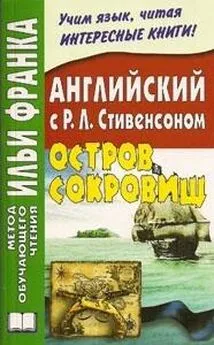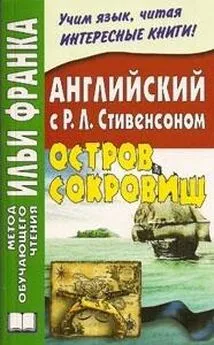Илья Франк - Английский язык с Р.Л. Стивенсоном. Остров сокровищ
- Название:Английский язык с Р.Л. Стивенсоном. Остров сокровищ
- Автор:
- Жанр:
- Издательство:неизвестно
- Год:неизвестен
- ISBN:нет данных
- Рейтинг:
- Избранное:Добавить в избранное
-
Отзывы:
-
Ваша оценка:
Илья Франк - Английский язык с Р.Л. Стивенсоном. Остров сокровищ краткое содержание
Английский язык с Р.Л. Стивенсоном. Остров сокровищ - читать онлайн бесплатно ознакомительный отрывок
Интервал:
Закладка:
articles. I'd have had you but for that there lurch: but I don't have no luck,
not I; and I reckon I'll have to strike, which comes hard, you see, for a master
mariner to a ship's younker like you, Jim.'
2. I was drinking in his words and smiling away, as conceited as a cock upon a
wall, when, all in a breath, back went his right hand over his shoulder.
Something sang like an arrow through the air; I felt a blow and then a sharp
pang, and there I was pinned by the shoulder to the mast. In the horrid pain
and surprise of the moment — I scarce can say it was by my own volition, and
I am sure it was without a conscious aim — both my pistols went off, and both
escaped out of my hands. They did not fall alone; with a choked cry, the
coxswain loosed his grasp upon the shrouds, and plunged head first into the
water.
Мультиязыковой проект Ильи Франка www.franklang.ru
570
Chapter XXVII (глава 27)
'Pieces of Eight' (пиастры; piece of eight — песо / испанская монета в восемь
реалов/ )
Мультиязыковой проект Ильи Франка www.franklang.ru
571
OWING to the cant of the vessel (из-за накренения судна; owing to — по
причине, вследствие; to owe — быть должным /кому-л./; быть в долгу /перед
кем-л./; быть обязанным ), the masts hung far out over the water (мачты нависли
прямо над водой; far out — далеко наружу ), and from my perch on the cross-
trees I had nothing below me but the surface of the bay (и под моим насестом на
салинге не было ничего, кроме поверхности /воды/ бухты; perch — жердь,
насест ). Hands, who was not so far up (Хендс, который был не так высоко =
взобрался ниже меня), was, in consequence, nearer to the ship (был в результате
/этого/ ближе к кораблю), and fell between me and the bulwarks (и упал /в воду/
между мной и фальшбортом). He rose once to the surface in a lather of foam and
blood (он поднялся один раз на поверхность = всплыл в кровавой пене; lather
— пена /от мыла, моющего средства и т. п./; foam — пена ), and then sank
again for good (и затем погрузился снова навеки; to sink ). As the water settled, I
could see him lying huddled together on the clean, bright sand in the shadow of the
vessel's sides (когда вода успокоилась, я видел, как он лежал, съежившись, на
чистом светлом песке в тени бортов судна; to settle — установиться, улечься,
устраиваться; to huddle — съеживаться, свёртываться калачиком ). A fish
or two whipped past his body (рыбка или две проплыли быстро над его телом;
to whip — хлестать; юркнуть, выскочить ). Sometimes, by the quivering of the
water (иногда, при колебании воды), he appeared to move a little, as if he were
trying to rise (казалось, что он немного шевелится, как если бы пытался
встать). But he was dead enough, for all that (но он был мертв достаточно =
вполне, тем не менее), being both shot and drowned (будучи и застреленным, и
утопленным), and was food for fish in the very place where he had designed my
slaughter (и был пищей для рыб на том самом месте, где задумал убить меня;
slaughter — кровопролитие, резня, забой ).
сonsequence [`kOnsIkwqns] lather [`lRDq] quivering [`kwIvqrIN] slaughter
[`slLtq]
Мультиязыковой проект Ильи Франка www.franklang.ru
572
OWING to the cant of the vessel, the masts hung far out over the water, and
from my perch on the cross-trees I had nothing below me but the surface of
the bay. Hands, who was not so far up, was, in consequence, nearer to the
ship, and fell between me and the bulwarks. He rose once to the surface in a
lather of foam and blood, and then sank again for good. As the water settled, I
could see him lying huddled together on the clean, bright sand in the shadow
of the vessel's sides. A fish or two whipped past his body. Sometimes, by the
quivering of the water, he appeared to move a little, as if he were trying to
rise. But he was dead enough, for all that, being both shot and drowned, and
was food for fish in the very place where he had designed my slaughter.
1. I was no sooner certain of this than I began to feel sick, faint, and terrified (как
только я убедился в этом, я начал испытывать тошноту, слабость и ужас; be
certain of — быть уверенным в чем-то ). The hot blood was running over my
back and chest (горячая кровь бежала /струйками/ по моей спине и груди). The
dirk, where it had pinned my shoulder to the mast (кинжал, там = в том месте,
где он пригвоздил мое плечо к мачте), seemed to burn like a hot iron (казалось,
жег, словно раскаленное железо); yet it was not so much these real sufferings
that distressed me (но все-таки не эти реальные страдания тревожили меня; to
distress — причинять страдание, горе; мучить, терзать ), for these, it seemed
to me, I could bear without a murmur (их, казалось мне, я могу выносить
безропотно; murmur — шепот; ворчание; ропот ); it was the horror I had upon
my mind of falling from the cross-trees into that still green water (это был ужас,
бывший у меня на уме = меня ужасала мысль падения с салинга в эту
неподвижную зеленую воду), beside the body of the coxswain (около тела
рулевого).
2. I clung with both hands till my nails ached (я вцепился /в салинг/ обеими
руками, пока мои ногти не заболели), and I shut my eyes as if to cover up the
Мультиязыковой проект Ильи Франка www.franklang.ru
573
peril (и закрыл глаза, как будто чтобы скрыть = не видеть опасность).
Gradually my mind came back again (постепенно голова моя прояснилась
снова; mind — разум; память ), my pulses quieted down to a more natural time
(скорость биения /сердца/ снизилась до более нормального темпа; pulse —
пульс, биение, ритм, удар; to quiet down — утихать, успокаиваться ), and I
was once more in possession of myself (и я снова владел собой: «был во
владении себя»).
suffering [`sAfqrIN] murmur [`mq:mq] natural [`nxtSqrql] possession [pq`zqSn]
1. I was no sooner certain of this than I began to feel sick, faint, and terrified.
The hot blood was running over my back and chest. The dirk, where it had
pinned my shoulder to the mast, seemed to burn like a hot iron; yet it was not
so much these real sufferings that distressed me, for these, it seemed to me, I
could bear without a murmur; it was the horror I had upon my mind of
falling from the cross-trees into that still green water, beside the body of the
coxswain.
2. I clung with both hands till my nails ached, and I shut my eyes as if to cover
up the peril. Gradually my mind came back again, my pulses quieted down to
a more natural time, and I was once more in possession of myself.
1. It was my first thought to pluck forth the dirk (моей первой мыслью было
выдернуть кинжал); but either it stuck too hard or my nerve failed me (но либо
он вонзился слишком сильно, либо мужество покинуло меня; nerve — нерв,
присутствие духа, сила воли; to fail — терпеть неудачу; подвести ); and I
desisted with a violent shudder (и я отказался /от этой затеи/ с сильным
содроганием; violent — неистовый; интенсивный, сильный /например, о
Мультиязыковой проект Ильи Франка www.franklang.ru
574
боли/ ). Oddly enough, that very shudder did the business (как ни странно, это
самое содрогание выполнило работу = помогло мне). The knife, in fact, had
come the nearest in the world to missing me altogether (нож, на самом деле,
прошел ближе всего в мире к /точке/, чтобы не попасть в меня совсем = нож
меня только чуть-чуть задел меня); it held me by a mere pinch of skin (он
держал меня лишь за кусочек кожи; pinch — щипок, щепотка ), and this the
shudder tore away (и этот /кусочек/ вздрагивание оторвало; to tear away —
отрывать, освобождать ). The blood ran down the faster, to be sure (кровь,
конечно, побежала быстрее = сильнее); but I was my own master again (но
/зато/ я освободился: «был своим собственным хозяином снова»), and only
tacked to the mast by my coat and shirt (и /был/ только пригвожден к мачте
камзолом и рубахой; to tack — присоединять гвоздями или кнопками,
Читать дальшеИнтервал:
Закладка:


